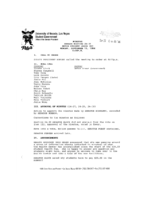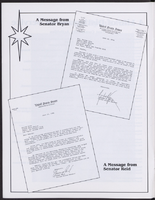Search the Special Collections and Archives Portal
Search Results

Della Coates interview, March 18, 1978: transcript
Date
Archival Collection
Description
On March 18, 1978, collector Bill Hitchcock interviewed Della Coates (b. June 17th, 1919 in Birmingham, Alabama) at her home in Las Vegas, Nevada. In the interview, Della Coates discusses her time working for the telephone company. She also speaks about the changes in education and about changes throughout Las Vegas.
Text

Meeting minutes for Consolidated Student Senate, University of Nevada, Las Vegas, March 06, 1979
Date
Archival Collection
Description
Text

Meeting minutes for Consolidated Student Senate University of Nevada, Las Vegas, November 15, 1984
Date
Archival Collection
Description
Text

Transcript of interview with Sherwin "Scoop" Garside by David Anderson, March 25, 1976
Date
Archival Collection
Description
On March 25, 1976, David Anderson interviewed Sherwin “Scoop” Garside (born May 26, 1915 in Tonopah, Nevada) about his life in Southern Nevada. Garside first talks about his father’s business in running an early Nevada newspaper and his personal knowledge of the early mining that took place in different parts of Nevada. He also talks about living in the town of Tonopah, the American Indians who lived in the area, and his experiences from living in Las Vegas. Garside also mentions the beginnings of gambling in Las Vegas, the population boom periods of Las Vegas, and his experiences in witnessing the aboveground atomic testing.
Text

Meeting minutes for Consolidated Student Senate University of Nevada, Las Vegas, September 19, 1994
Date
Archival Collection
Description
Text

Interview with Stuart C. Black, February 21, 2006
Date
Archival Collection
Description
Text

Interview with Jerome Alexander Zawada, August 9, 2006
Date
Archival Collection
Description
Text

Interview with James Nobuo Yamazaki, October 14, 2005
Date
Archival Collection
Description
Text

Interview with Layton James O'Neill, July 23, 2004
Date
Archival Collection
Description
Text

